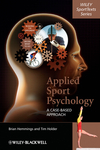Applied Sport Psychology: A Case-Based Approach
 Applied Sport Psychology: A Case-Based ApproachISBN: 978-0-470-72574-0
Paperback
264 pages
August 2009
This is a Print-on-Demand title. It will be printed specifically to fill your order. Please allow an additional 10-15 days delivery time. The book is not returnable.
Learn more about this book
|
|||||||
Author Interview: Dr Brian Hemmings & Dr Tim Holder - St. Mary's University College
Brian Hemmings is a Visiting Professor of Sport Psychology at St. Mary's University College. He gained his PhD from the University of Southampton in 1998, and is a chartered and accredited consultant sport psychologist working full-time in private practice. Brian has worked extensively with a range of Olympic, professional and amateur sports for over fifteen years and is currently actively involved with elite performers in International golf, cricket and motor racing.
Tim Holder is a Reader in Applied Sport Psychology at St. Mary’s University College. He is a BASES accredited Sport and Exercise Psychologist and has a PhD from the University of Southampton. He has worked with a number of governing bodies since he started practising as a sport psychologist in 1989 including table tennis, swimming, squash, amateur boxing and sailing as well as consulting with individual performers from a range of sporting activities.
Q) Over 400 million people are expected to watch the world cup finals in South Africa this year. Has the development of sports a global business increased the need for psychological support?
There can be no doubt that sport psychologists are playing a more prominent role in professional sport all around the world. In the UK, for example, the advent of lottery funding to increase direct support for elite athletes has seen National Governing Bodies, and Institutes of Sport invest more in the psychological preparation of athletes for major competitions like the Olympic and Commonwealth Games. But this is not to suggest that only elite sport has benefited, as sport psychology has been influential in many areas such as youth sport and coach education. The book details this development, and also covers interventions in these less publicised areas.
Q) How vital is confidence for professional sportspeople?
Yes, of huge importance, and the development of this psychological skill is covered in numerous chapters of the book. However, sport psychologists work on so much more than this one skill. Successful sports performance requires an array of psychological skills such as self-awareness, concentration, and optimal arousal, and the book describes in detail the kind of techniques sport psychologists may use to develop these skills.
Q) What would you say is the single most important psychological skill a successful coach should have?
It is difficult to say there is one key skill. Experience shows that different coaches have different needs, and that the mark of a successful coach is to identify which skills they need to develop. Equally, then the mark of a good sport psychologist is to be adaptable and flexible, and help the coach in that identification process, and then develop an individualised programme to develop that skill. The individual nature of support work to target specific skills is a strong feature of the book, whether it is with athletes, teams, coaches or other support staff.
Q) Are the case studies featured in the book relevant only to top level athletes or are there lessons for enthusiasts and amateurs?
Good question. Let’s take the example of dealing with pressure. Whilst this may seem surprising, the experience of sport psychologists is that many people who compete in sport experience ‘pressure’, whether they are professionals or amateurs. For example, simple discussion with individuals who only play sport recreationally will often reveal this psychological aspect of sport which challenges them. Whilst, the consequences of success and failure may differ across participants, the mental processes that occur are essentially the same for all. Hence, the book is not only about elite performance, in that many of the interventions applied are equally applicable to the club cricketer or weekend golfer.
Q) How important are the use of case study examples for students studying sports psychology?
Very important. The introduction to the book stresses the role of case studies to develop knowledge. The book is very different to the current literature in sport psychology which is predominantly focused on theory and research. The book is unique in that it takes the theory and research and shows how it is used in applied practice. The real life scenarios are very engaging, and given the very lure of sport psychology for students is their fascination of its ‘real world’ application, the book offers a great insight into how sport psychology is delivered by leading consultants.
Q) What are the main challenges facing Sport Psychology lecturers?
Our experience delivering sport psychology in Higher Education over a twenty year period, and in our professional communication with other lecturers about this issue, shows that one of the main challenges is ‘bringing the subject alive’. The style and the content of the book originated from our overriding concern that sport psychology lecturers needed innovative ways of engaging students with the knowledge base in the discipline. With this in mind, clearly written case studies by leading practitioners showing evidence-based practice and reflective practice offered a much needed resource.





